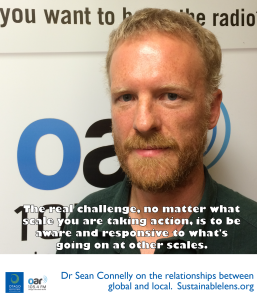The real challenge, no matter what scale you are taking action, is to be aware and responsive to what’s going on at other scales.
Dr Sean Connelly is a lecturer in Geography at University of Otago. We talk about how sustainability at a global scale is made of sustainable local communities – but that there’s a long way to go before those two are in harmony.
Talking points
Local populations get caught up in global environmental movement
If we are concerned with building and scaling up our actions, it’s hard to imagine what things look like at the global level, whereas we can easily talk about what happens in our own back yard.
My entry point is the unequal relations between the local and the global – local populations impacted by decisions made at much larger scales, often with very little thought given to their needs, or what control they have over their own environment, lifestyle and social well-being.
The real challenge, no matter what scale you are taking action, is to be aware and responsive to what’s going on at other scales.
Everything is interrelated, everything is complex, we live in one global system – with all kinds of subsystems but they are all interrelated.
Being aware of those interrelationships is really difficult, and in some ways being aware of the local offers some appeal. It can be romanticised as the wonderful place – everything’s fine, we can do things in our locality and forget about the challenges of making the connections beyond this place. but how do we connect a whole bunch of different localities around similar kinds of issues?
Human geography, people and environment – where do we place our emphasis.
(Human relationship with nature?) Challenging. Look at the state of the environment, locally, nationally and globally – there’s a lot to be concerned about, enough to suggest that our relationship to the environment should be rethought. We should be thinking about that relationship differently.
There are exciting and inspiring stories of people rethinking practices.
(On introducing sustainability in education) Start with state of the environment – why is this stuff critically important. But is is challenging to start with doom and gloom, it can be disempowering, the last thing you want to do is start by saying the future is pretty bleak. So the challenge it to tell it like it is, this is the state of the environment, but also to tell inspiring stories. This is the case of the present, our future is not locked in. We have complete control over our future – this is something only we can decide.
The term sustainability can be a quagmire…but this notion of, I don’t want to say balancing because I think that is where a lot of the discourse around sustainable development falls down, this notion of balancing and making trade-offs between the economy and society and the environment – but rather it is about how do we view those things as mutually reinforcing and integrating them, thinking about them much more holistically.
How do we embark on initiatives that don’t trade off any of these things against the other?
It is hugely problematic to put a dollar value on nature – it reinforces the very things that we don’t want to be doing – the whole problem is that setting a dollar value means it is expendable, we can use it and abuse it and just trade it for something else.
Engaging in food as a community, not just a commodity.
The scale issue is the critical challenge. Whether talking about food or energy, we can point to innovative examples, but they are still quite small – they don’t have huge impact on the way the majority of us go about our daily lives.
A lot of the food system infrastructure is social infrastructure. The real value of farmers markets, is the social relationships.
(Activist?) Yes. And that is particularly touchy for a Canadian at this point. Interesting things going on right now around the tar sands, the RCMP spying on environmental organisations concerned about blocking pipelines…claims of environmental radicals attempting to highjack the regulatory process…so this can be seen as a threat or source of pride – yes I am a radical. We’ve seen all kinds of people, grandmothers, people with children in the streets saying “you know what, I am a radical” We should all be radicals.
(Motivation?) All kinds of possibilities, for me this area of sustainability is so fascinating, there’s so many different aspects and entry points, and it is absolutely critical, the most important issue we’re facing, not just as individuals but as a species. And there are all kinds of inspiring activities that are going on.
(Advice?) If you are concerned with issues of the environment and sustainability, then follow your passion, no matter what it is that motivates you, there’s a sustainability angle to it.

